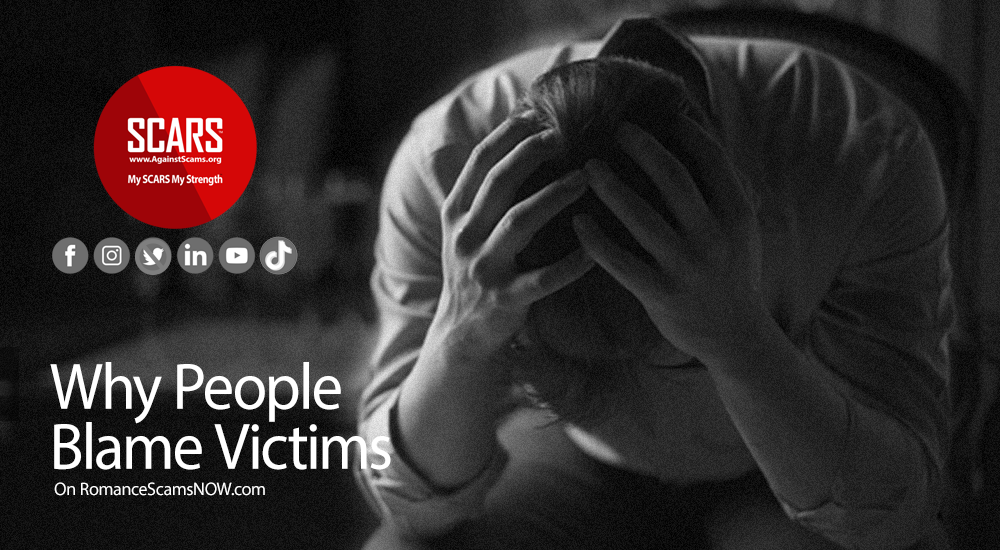This Is Called The Just-World Phenonema
Why We Blame Victims In Order To Rationalize Why Bad Things Happen?
According to VeryWellMind.com:
The just-world phenomenon is the tendency to believe that the world is just and that people get what they deserve.
Because people want to believe that the world is fair, they will look for ways to explain or rationalize away injustice, often blaming the person in a situation who is actually the victim.
The just-world phenomenon helps explain why people sometimes blame victims for their own misfortune, even in situations where people had no control over the events that have befallen them.
Strangely, this also helps to explain why crime victims often blame themselves – not the whole reason, but it does controbute.
Just-World Theory and Victim-Blaming
The just-world theory proposes that when people do fall victim to misfortune, others tend to look for things that might explain their circumstances. In other words, people have an automatic tendency to look for something or someone to blame for unfortunate events. But rather than simply attributing a bad turn of events to bad luck or the action of a criminal, people tend to look at the individual’s behavior as a source of blame. Victims tend to apply this same lens to themselves in the process.
Conversely, this belief also leads people to think that when good things happen to people it is because those individuals are good and deserving of their happy good fortune. Because of this, people who are extremely fortunate are often seen as more deserving of their good luck. In other words, they must be good people! Rather than attributing their success to luck or circumstance, greed or desire! People tend to ascribe their fortune to the intrinsic characteristics of the individual. These people are often seen as being more intelligent and hard-working than less fortunate people.
Ironically, this desire for recognition is also a big part of what drives the scammers themselves! They desire to be seen and recognized, and when they make enough money (by stealing it) others will see them a “good” people too!
Why Is This So?
So Why Does The Just-World Phenomenon Happen?
There are a few different explanations that have been proposed to explain it:
- The fear of facing vulnerability. [We talked about this in the Hindsight Bias] People do not like to think about themselves being the victims of a crime. So when they hear about an event such as a romance scam or other crime, they may try to assign blame for the event on the victim’s behavior. This allows people to believe they can avoid being victims of crime just by avoiding past victims’ behaviors. Ironically, there is a kernel of truth in this, since scams happen because of high-risk behaviors coupled with ignorance – it is not that the victims are to blame, but the lack of preparation and knowledge enabled the crime.
- A desire to minimize anxiety. Another possible explanation for the Just-World Phenomena is that people want to reduce the anxiety that is caused by the world’s injustices. Believing that the individual is completely responsible for their misfortune, people are able to go on believing that the world is fair and just. Of course, we know that it is not.
Benefits From This?
The belief or bias does have some benefits. Like other types of cognitive bias, this phenomenon protects self-esteem, helps control fear, and allows people to remain optimistic about the world.
Obviously, this belief-system also has some major downsides!
By blaming victims, people fail to see how the situation and other variables contributed to another person’s (or their own) misfortunes. Additionally, research published in 2017 has shown a link between belief in the just-world theory and dishonest behavior. Instead of expressing empathy, the just-world phenomenon sometimes causes people to be disinterested or even scorn victims.
What Is The Answer?
Very simply it is to take an inventory of your own cognitive biases by learning what they are and examining your own beliefs to see if you harbor them.
When you hear about or talk to a crime victim and you begin to feel that blame rising, damp it down. The more you take control over your own biases the more you reduce their power over you.
For victims themselves, learn about how these belief-systems work in your own mind. The more you learn the more you take their power away. But begin simply by recognizing that you are not to blame.
How Do You Stop Someone From Blaming You For Your Scam?
You say this to them:
“I realize that this may be something you do not understand, and if I can be scammed it means you can also. Feeling vulnerable and powerless is frightening. But instead of judging, it is better that we learn together how we can all be safe in the world around us. Blaming victims may make you feel better but it does nothing to really help. Please try to remember this!”
We thank VeryWellMind.com for portions of this article.




Leave A Comment